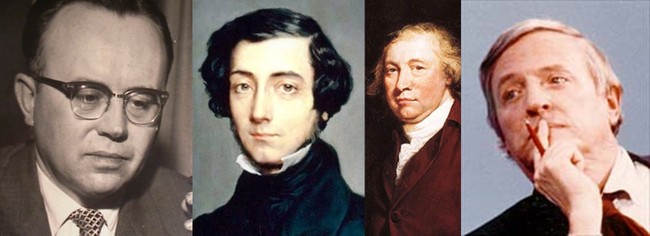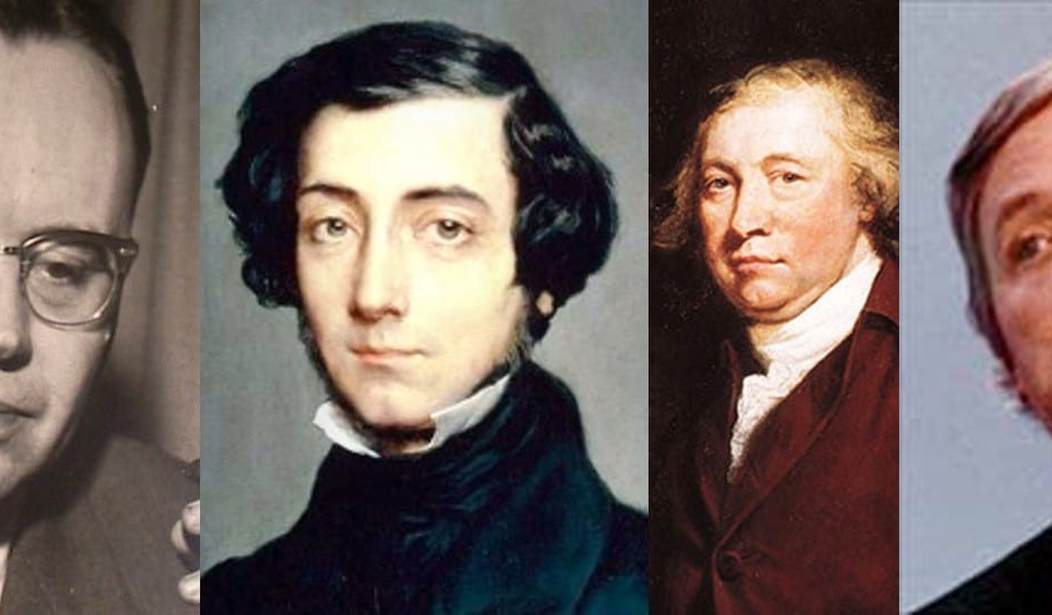
There are probably, in my opinion, four great conservative thinkers who seem to define what conservatism is or should be all about.
EDMUND BURKE- THE BASICS
The first is Edmund Burke who believed that politics was an outgrowth of ethics. He believed that there were absolute moral truths and that they had their roots in traditions, customs, and mores. They, in turn, had their roots in religion. Speaking from a Western civilization point of view, he found those roots in the Judeo-Christian thought of the time.
However, religion need not be the only or even the major determinant; history also played a role. He believed that history taught leaders “temperance” and restraint in the use of power. Regarding rights, he would view today’s liberal the equivalent of the French Jacobin- discovering abstract rights where none are rightfully found.
Most importantly, and probably one of the defining characteristics of conservatism, is that if there is to be change, then it should be slow and incremental. Many describe the civil rights fights as slow and tortuous, but Burke would have argued for that long, slow and tortuous road rather than drastic change, especially when something affects our basic principles, morals, traditions and customs. Perhaps this is why 40+ years later, abortion, which affects a basic right to life, remains a controversial topic. One can surmise that gay marriage will remain a hot topic since it affects a deeply-held tradition and custom involving its very definition.
ALEXIS DE TOCQUEVILLE- THE OBSERVER
The Frenchman Alexis de Tocqueville wrote Democracy in America, a book that 170 years later rings true today. He observed the young democracy and noted four potential problems and things that should be avoided. The first was the tyranny of the majority and by this he meant the majority opinion of the populace. He worried that governmental power would be concentrated in a single authority where citizens would be “reduced to nothing better than a flock of timid and industrious animals, of which the government is the shepherd.” It is then that the majority would trample on the rights of the minority. The tyranny is manifested by the majority tendency to denigrate and lessen the legitimacy of views not sanctioned by the majority at a particular point in time. He described it as the majority drawing a circle around thought. Once one steps outside that circle, one is subjected to persecution. This accurately describes a modern tendency- political correctness. How true that rings today.
Second, equality serves to level differences while freedom serves to elevate differences. Here, the concept of rights are absolutely essential for a cohesive and prosperous society. The biggest problem with America was not its weaknesses, but its democratic strength. It was not the government, laws or institutions that was preventing a slide into tyranny of the majority; it was our mores, customs and traditions. Tocqueville saw religious life in America providing those mores. Thus it was religion that was the glue that held America together and kept it slipping into tyranny or anarchy.
The source of many problems today is a drift away from the mores and morality that religion previously provided to the country. Whether by design or ignorance (or both), the liberal tendency to a secular society has weakened the bonds that have held America together. The question is whether we have crossed the Rubicon in that area and there is no way back. That is why conservatism must seek to do that; not to force a religion upon a society, but as a means to re-establish that common bond that once held the country together cohesively.
Tocqueville noted that equality was America’s fate. But he questioned whether that equality led to “servitude or freedom, to enlightenment or barbarism, to prosperity or misery.” The greatest threat was not tyranny, but general apathy which democracy nurtures but cannot endure in the long term.
The third observation was materialism. He noted that America was more materialistic than Europe for three reasons. First, we had freed ourselves of “territorial aristocracy” creating an atmosphere where the poor aspired to greater heights while the rich feared falling from those heights. Second, all Americans have equal opportunity to advance themselves in life. Slight differences in wealth are often noted the most which destroys the notion of equality. In other words, the obvious and inherent inequalities are the impetus towards equality. The quest for equality explains both mass consumption and conspicuous wealth. American affluence poses the greatest threat to American religion. Yet religion poses no threat to affluence if that affluence is directed in conjunction with our morals, mores, customs and traditions.
The final danger to American democracy is the tendency towards bureaucracy which thrives in an atmosphere of a lack of statesmanship and citizenship. He foresaw that industrialization and economic stability may be a cause for bureaucracy, but he also noted that the most corrupt society would be one of the most advanced and/or disciplined bureaucracy. That aptly describes socialism. Viewed in light of the above considerations, one can see that a heavy reliance on bureaucracy necessarily leads to a regulated nanny state. He called this a “soft despotism” and worse than the worst tyrannies of history. It would “degrade men without tormenting them.”
Elected officials are far removed from responsibility to the point that they cannot effect grand measures such as securing our borders. To the progressive, the public interest is defined by current circumstances. It explains the liberal doctrine of legal realism and why activist judges discover “rights” where none are rightfully found.
RUSSELL KIRK- THE UPDATER
In the 1950’s, the political philosopher and writer Russell Kirk stated the six canons of conservatism in his book, The Conservative Mind. Kirk basically updated Burke’s beliefs and added or expounded upon some. The six canons are:
- Belief in a “transcendent” order, or natural body of law, that rules society and the conscience. Political problems were basically moral ones. Rights are basic and cannot be derived from man.
- “Affection for the proliferating variety and mystery of human existence, as opposed to the narrowing uniformity, egalitarianism, and utilitarian aims of most radical systems.” Put another way, this is a rejection of the one-size fits all mentality of the Left.
- Civilized society requires order and classes. If natural differences are ignored, oligarchs and tyrants will rush in to fill the vacuum. Everyone is equal in the eyes of God only and should be equal before the law.
- Property and freedom are closely linked. If one separates property from private possession, “Leviathan becomes master of all.” Therefore, economic leveling is not economic progress. This canon also helps explain why one becomes more conservative in their outlook once they become property owners. The reason is simple: they have a tangible, vested interest in that property. Conservatism believes that the individual, not the government, is the best steward of individual property.
- Distrust of “sophisters, calculators, and economists” who would reconstruct society upon abstract designs. Traditions and customs are checks upon anarchy and lust for power.
- Recognize the need for change, but that such change not be salutary, that it be gradual, and that it be prudent. To the progressive Left and populists, change for the sake of change is the mantra as long as it is change that comports to their agenda. If there is to be change, besides being gradual and prudent, it must be achieved through the established democratic institutions.
WILLIAM F. BUCKLEY- THE STRATEGIST
When Buckley first started to become influential, there were three strands of conservatism: (1) traditional conservatives appalled by the secular masses, (2) libertarians repelled by a growing bureaucratic state threatening free enterprise and individualism, and (3) former liberals concerned by the growing Communist threat. As founder and leader of the National Review, he kept these sometimes disparate views together and gave them an equal voice on the pages. That was the genius of Buckley- his ability to fuse the three strands into one.
Whether from the Left or Right, he warned that keywords like “national unity,” “middle-of-the-road,” “progressivism,” and “bipartisanship” were suspect ones because they usually foretold of a lack of principle on either side. Buckley’s strategy was fourfold: keep the GOP tilted to the Right, eliminate any and all extremists, fight liberals at every opportunity, and ensure nothing short of victory over the Communists.
Buckley viewed, correctly, that America was actually a bastion of conservatism. He rejected the liberal belief that truths are “ transitory and empirically determined.” He rejected the notion that equality is only attainable through the actions of government.
Conversely, conservatism was based on “freedom, individuality, the sense of community, the sanctity of the family, the supremacy of the conscience, the spiritual view of life.” Political order should be judged by whether it promotes or degrades personal freedoms.
No discussion of Buckley would be complete without mentioning the so-called Buckley Rule. The actual comment was to elect the “most rightward viable candidate.” There are two parts to this. The first is that the voter first must gauge the “rightward” aspect of the candidate. That does not mean to check off every box, but as many as possible
The second is to gauge the “viability” of the candidate and may be specific to the race or state. Unfortunately, many times the GOP has put up candidates who profess their conservative credentials during campaigns, but act quite differently when actually elected. So the question becomes whether the candidate is principled in their beliefs and then acts upon those principles. I posit that there are precious few elected “conservatives” who meet these basic requirements today.













Join the conversation as a VIP Member